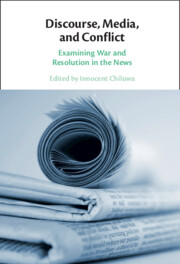Book contents
- Discourse, Media, and Conflict
- Discourse, Media, and Conflict
- Copyright page
- Contents
- Figures
- Tables
- About the Authors
- Foreword
- Introduction
- Part I Conflict Discourse in Newspaper Reporting
- Part II Electronic Media and Online Discourses of Conflict
- 5 Making a Case for War
- 6 “The Situation on the Korean Peninsula”
- 7 Against a Hard-Earned Peace
- 8 Ideological Exclusion
- 9 Violence for Social Change
- Part III Media Discourse and Conflict Resolution
- Index
- References
9 - Violence for Social Change
An Analysis of the #FeesMustFall Movement in South Africa
from Part II - Electronic Media and Online Discourses of Conflict
Published online by Cambridge University Press: 21 April 2022
- Discourse, Media, and Conflict
- Discourse, Media, and Conflict
- Copyright page
- Contents
- Figures
- Tables
- About the Authors
- Foreword
- Introduction
- Part I Conflict Discourse in Newspaper Reporting
- Part II Electronic Media and Online Discourses of Conflict
- 5 Making a Case for War
- 6 “The Situation on the Korean Peninsula”
- 7 Against a Hard-Earned Peace
- 8 Ideological Exclusion
- 9 Violence for Social Change
- Part III Media Discourse and Conflict Resolution
- Index
- References
Summary
This chapter investigates the extent to which the #FeesMustFall social movement protests of 2015 and 2016 at the University of the Witwatersrand, South Africa, used violence as an ideological weapon to cause social change in the higher education sector. Applying thematic analysis of interviews conducted with eleven stakeholders (including student activists, university management staff, academic union, and government representatives), and data from tweets collected between October 8 and 20, 2015 and September 19 and October 11, 2016, the chapter argues that the movement used violence to disrupt the inherent systematic violence of the state and university space that has hindered students’ socioeconomic and cultural development. Results further show that the movement’s adoption of violence was influenced by Franz Fanon’s “On Violence,” which resulted in the contestation of ideas by the different stakeholders on ways of achieving social change.
- Type
- Chapter
- Information
- Discourse, Media, and ConflictExamining War and Resolution in the News, pp. 213 - 232Publisher: Cambridge University PressPrint publication year: 2022
References
- 1
- Cited by



